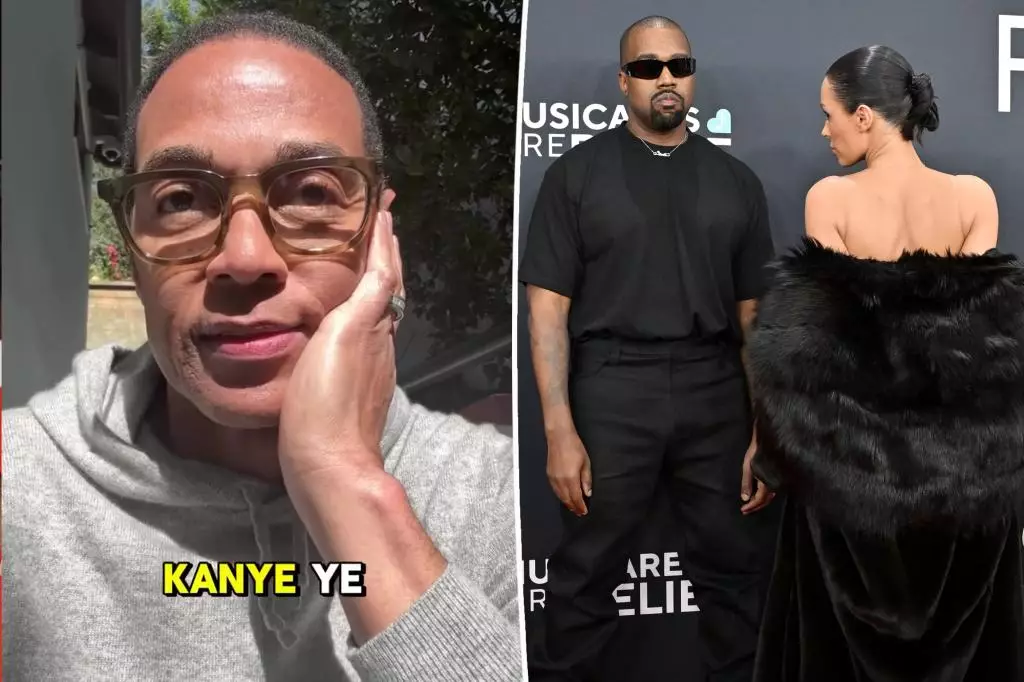In the dynamic sphere of celebrity interactions, few exchanges have summoned as much intrigue as the recent feud between news anchor Don Lemon and rapper Kanye West. The exchange escalated when West labeled Lemon a “coon” on social media, after the anchor shared information suggesting that West and his wife, Bianca Censori, were removed from the Grammy Awards. This situation showcases how public figures often clash over issues of respect, identity, and the narratives surrounding them.
Lemon, known for his forthright demeanor and engaging reporting style, expressed his disappointment at West’s choice of words, acknowledging the weight the term carries within the Black community. The invocation of respect in this scenario is vital; it underscores the expectant mutual acknowledgment that should exist between Black men, especially in the public eye. This aspect of respect ties deeply into both men’s identities and their understanding of their cultural backgrounds.
The Battle of Narratives
The root of this conflict lies not only in a rumor but also in how narratives are constructed and communicated in the media landscape. According to Lemon, his intent was not to malign West but to relay information he had come across, emphasizing that he himself did not witness the event. This insistence on intent raises critical questions about how information is disseminated in our media-driven society and holds implications for the accountability of those who share such narratives.
Moreover, West’s quick pivot to blame Lemon reflects the defensiveness that can arise when artists face scrutiny. His response was emblematic of a broader trend wherein celebrities oscillate between seeking public attention and confronting negative press. The term “goofball” used by West serves as an emotional rebuttal, stripping away the complexity of the issue and reducing it to a personal attack. This tactic, all too familiar in celebrity disputes, often detracts from the larger conversations regarding race and media representation.
Lemon’s confrontation with West extends beyond a public spat; it reveals the intricacies of personal and professional interactions in high-pressure environments, such as award shows. Lemon recounted how, during an interview attempt, West dismissed him, citing focus as the reason for rejection. This rejection can be interpreted not merely as a brush-off but reflects a prevailing sentiment among some public figures: a desire to control their own narrative amidst the swirling chaos of public commentary.
The Grammy event itself, characterized by spectacle and controversy, only adds layers to this confrontation. West and Censori’s choice to unveil a provocative outfit on the red carpet, later defended as a marketing stunt, is characteristic of West’s theatrical persona. Lemon’s remarks about West being a “master marketer” bear significance, revealing an acknowledgment of West’s brilliance in maintaining the public’s attention—often at the expense of others.
The escalation of tensions culminated in Lemon taking to social media to refute West’s allegations. His video aimed not just to clarify misconceptions but also to reinforce his integrity and standing in the media world. Lemon’s message urged West to understand the intricacies of media engagement and the impact it can have on reputations. His remark about the “Make America Great Again” hat resonates with deeper cultural and political connotations, representing the often contentious intersection of artistry and politics.
The overall discourse presents fascinating insights into behavioral dynamics between Black public figures and the broader implications of how they are perceived. The notion of respect is neither easily defined nor universally adhered to—it varies based on context, personal experience, and societal pressures.
The skirmish between Don Lemon and Kanye West encapsulates far more than a celebrity showdown. It illuminates the struggles for identity, respect, and the pursuit of authenticity in a world fraught with expectations and assumptions. Such conflicts, while seemingly trivial, can serve as powerful reminders of the undercurrents that influence public perception.
In the grand scheme of celebrity culture, this encounter highlights the importance of not only how individuals choose to communicate with one another but also how their actions and words resonate through the tapestry of their communities. As the dialogue evolves, it’s essential to cultivate understanding amidst the chaos, challenging public figures to embrace responsibility in their discourse while navigating the complexities of fame. This episode is a clarion call for deeper respect, understanding, and a reevaluation of the narratives perpetuated within the public realm.

